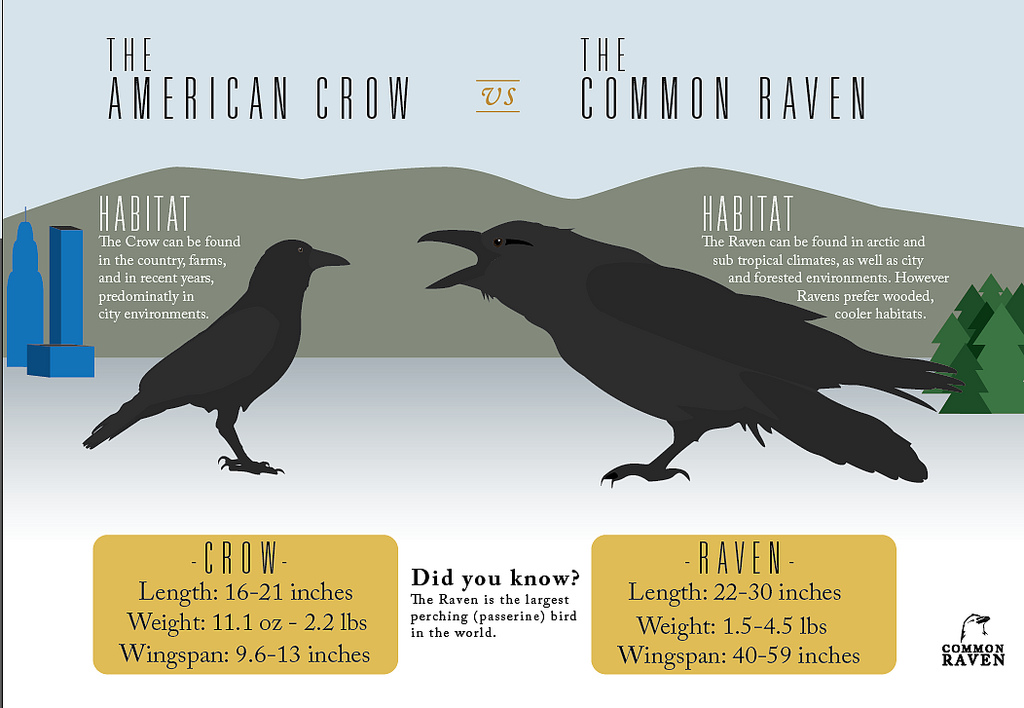When it comes to birds, crows and ravens often get mistaken for one another due to their similar appearances. However, these two species possess distinct characteristics that set them apart. While both belong to the Corvidae family, their behaviors, songs, and physical traits provide definite clues to their identities. In this article, we delve into the intriguing world of these intelligent birds to help you discern the differences between a crow and a raven. From their habitats to their vocalizations, understanding these distinctions can enrich your birdwatching experience.
The confusion between crows and ravens is not just a trivial matter; it reflects a broader curiosity about the natural world. These birds have captured human fascination across cultures and history, symbolizing everything from wisdom to bad omens. As we explore the nuances of their differences, we will uncover interesting facts that highlight the uniqueness of each bird. By the end of this article, you will have a clearer understanding of what separates a crow from a raven.
Join us as we set out on this avian exploration, answering common questions and providing insights that will enhance your appreciation of these remarkable birds. Whether you're an avid birdwatcher or simply curious, this guide will serve as a valuable resource for understanding the key differences between crows and ravens.
What Are the Key Physical Differences Between Crows and Ravens?
One of the first aspects to consider when distinguishing between crows and ravens is their physical appearance. Here are some differences:
- Size: Ravens are generally larger than crows, with a wingspan that can reach up to 4 feet compared to a crow's wingspan of around 2.5 feet.
- Beak Shape: Ravens possess a thicker, more curved beak, while crows have a straighter, thinner beak.
- Tail Shape: A raven's tail is wedge-shaped when spread, whereas a crow's tail is more fan-shaped.
- Feather Texture: Ravens have shaggier throat feathers, giving them a more rugged appearance.
How Do Crows and Ravens Differ in Their Vocalizations?
The sounds that crows and ravens make can also help identify them. While both are known for their intelligence, their vocalizations are distinct:
- Crows: Typically produce a "caw" sound, which is sharp and clear.
- Ravens: Have a deeper, more resonant "croak" and are known for a variety of calls, including playful clicks and whistles.
Where Do Crows and Ravens Prefer to Live?
Understanding the habitats of these birds can provide more insight into their behaviors:
- Crows: Commonly found in urban areas, fields, and forests.
- Ravens: Prefer more remote areas, including mountains and forests.
What Do Crows and Ravens Eat?
Both crows and ravens are omnivorous, but their diets can differ slightly based on their habitats:
- Crows: Often scavenge for food, including human leftovers, insects, and small mammals.
- Ravens: Tend to hunt more actively for food and can be seen feeding on carrion, small animals, and bird eggs.
Are There Differences in Behavior Between Crows and Ravens?
Behaviorally, crows and ravens exhibit some interesting distinctions:
- Crows: Known for their social behavior, often gathering in large groups.
- Ravens: Tend to be more solitary or found in pairs.
Can You Train Crows and Ravens?
Both species are incredibly intelligent, but their trainability can vary:
- Crows: Often trained for tasks and can mimic sounds easily.
- Ravens: Also capable of learning but may require more time and patience.
What Are the Cultural Significance and Symbolism of Crows and Ravens?
Crows and ravens have been featured in mythologies and folklore across cultures:
- Crows: Often associated with bad luck or death, appearing in numerous stories and superstitions.
- Ravens: Frequently symbolize wisdom and intelligence, appearing in various legends as guides or messengers.
In Conclusion, What’s the Difference Between a Crow and a Raven?
In summary, while crows and ravens share many similarities, their differences are marked in size, vocalization, behavior, and cultural symbolism. Recognizing these traits not only enhances your birdwatching experience but also deepens your appreciation for these fascinating creatures. The question, "what's the difference between a crow and a raven?" can now be answered with confidence, enabling you to enjoy the beauty and diversity of the avian world.
You Might Also Like
Unveiling The Life And Influence Of Brittany RennerDiscovering The Roots Of Rihanna: Where Is She From?
Unveiling The Mystery: Who Is YG Marley's Mother?
Heartfelt Thank You Messages For Birthday Wishes
Exploring The Depths Of ENM Relation: A Unique Perspective
Article Recommendations


